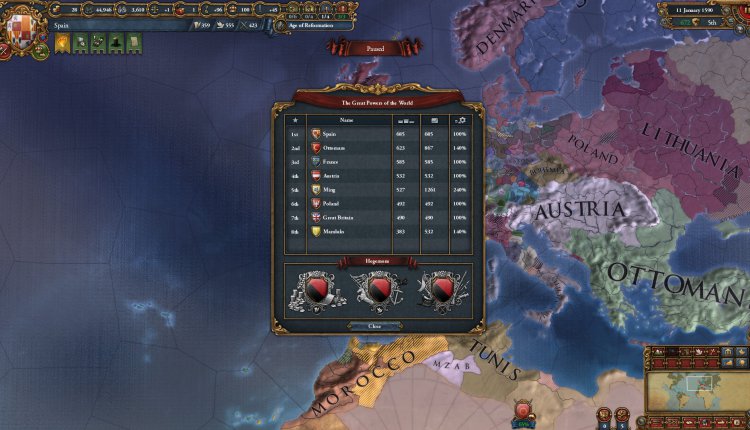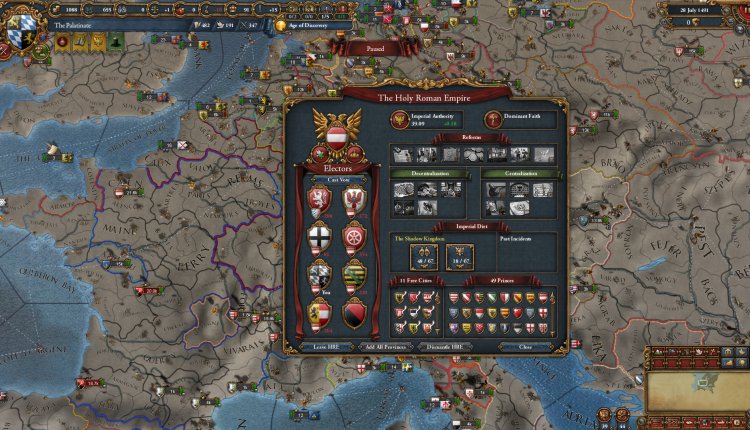Europa Universalis IV: Emperor brings the focus back to Europe
Alongside the long-awaited 1.30 Austria Update, Europa Universalis IV has received its next expansion pack in the form as Emperor, a DLC focusing on revolution, The Holy Roman Empire and reinvigorating the Catholic Church.
For me, Europa Universalis IV is definitely the slower, patient cousin of Crusader King II. It’s a game which I’ve had mixed experiences with, generally finding the European region a particularly messy affair. That said, as indicated in the name, it’s the central point of the time period, so I’ve repeatedly tried campaigns within the space. I just haven’t found it as interesting as the times I’ve started as Majaphait, Benin, or the Wanka. A large part of this is due to the loyalty salad that makes up the HRE, that large splattering of nations that dominate Eastern Europe.
If you play as France, they’re messing with you. If you play as any European or European-Adjacent faction and they’re there. While they’re not competitive in the realms of the ‘New World’, there’s always been a degree of randomness that comes especially from that cluster of counties. So, Emperor and 1.30 Austria should be more than welcome.
Let’s talk about Austria first. It’s a major update, adding Estate Balancing and Estate content to the core game. There’s also the addition of Mercenary Companies, Large Reforms, Admin tweaks, UX changes, Map Tweaks and added minor French and German state mission trees.
A lot of these effects are felt when you boot up a new game in Central Europe, although a quick dip into more international starting points benefits from the Estate changes almost immediately. It’s a really, really strong update, and like most of the patches that accompany these expansion packs, it is monumental and alters gameplay at a core level.
 It also leads the way for deeper gameplay mechanics to be introduced in the expansion. Emperor is teeming with features, almost enough-so to justify the massive gulf of time (18~ months) since the last one. Emperor deals with two historical uses of the term Emperor; of the ruling Holy Roman Empire and of post-revolution Emperor Napoleon. It does this by amping up the role of religion, revolution and hegemonies.
It also leads the way for deeper gameplay mechanics to be introduced in the expansion. Emperor is teeming with features, almost enough-so to justify the massive gulf of time (18~ months) since the last one. Emperor deals with two historical uses of the term Emperor; of the ruling Holy Roman Empire and of post-revolution Emperor Napoleon. It does this by amping up the role of religion, revolution and hegemonies.
The formation of a revolution is now different, it can be encouraged as politically structured revolution, or through a transition of power within a nation. This facilitates both popular revolution and political revolution vs the form we previously saw, which was more of a revolt. This means that there can be splits closer to historical schisms, and it facilitates things such as the rise of Napoleon — it also results in avalanche-style pivots to unison or collapse in a mismanaged HRE, something welcome for me.
 Beyond this, I mentioned religion. The Papacy has become more relevant, with a shift in mechanics making the religious structure feel much closer to the college of cardinals of CKII. There’s power in controlling the Papacy, and not just in the extremely powerful issuing of Golden Bulls. Rulers can actively unite against or for the reformation, which can now become an interesting mid-game concern.
Beyond this, I mentioned religion. The Papacy has become more relevant, with a shift in mechanics making the religious structure feel much closer to the college of cardinals of CKII. There’s power in controlling the Papacy, and not just in the extremely powerful issuing of Golden Bulls. Rulers can actively unite against or for the reformation, which can now become an interesting mid-game concern.
Europa Universalis IV: Emperor was definitely well worth the wait, although it’s 100% geared at players who like mucking around in Christian Europe. If that’s not you then maybe hold back for now, but I personally felt that it made that region much more interesting for me to play again — and as I said at the start, I normally don’t care for that part of the map.
Europa Universalis IV: Emperor is available now for PC, Mac and Linux.
Comments are closed.